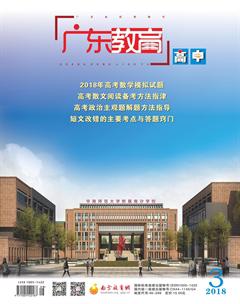短文改错的主要考点与答题窍门
王步定
短文改错题要得高分,需要弄清其特点和考查重点,同时还需有正确的解题方法。
一、错误类型
短文改错设置的错误类型主要有三种:语法错误、词汇错误和上下文逻辑关系错误。
二、设题特点
短文中共有10处语言错误,每句中最多有两处,每处错误仅涉及一个单词的增加、删除或修改。其中,要求考生增加、删除和修改的比例通常是1:1:8。
三、考查重点
1. 一致性问题。包括主谓一致、时态一致、并列动词的形式一致、代词指代一致等。
2. 词性问题。指不同词性的词在句中的不同作用。如,名词在句中常作主语、宾语、表语;动词在句中作谓语;形容词在句中作表语、定语和补语;副词在句中作状语,修饰形容词、动词和整个句子等。
3. 固定搭配。包括介詞与动词、名词、形容词的搭配;副词与动词的搭配;含定冠词、不定冠词、零冠词的固定词组;及物动词不带介词和不及物动词后要带介词才能接宾语等。
四、主要考点
1. 冠词。
(1)冠词的多用。
(2013年全国Ⅰ卷)In a fact, he even scared my classmates away...(删除fact前的a)
(2016年全国Ⅲ卷)At the first, I thought...(删除first前的the)
(2)冠词的少用。
(2011年全国Ⅰ卷)I would go to Xiamen for long holiday. (在for后增加a)
(2015年全国Ⅰ卷)I miss my home in countryside.(在countryside前增加the)
(2014年全国Ⅰ卷)As result, the plants are growing...(在result前增加a)
(2017年全国Ⅰ卷) I still remember how hard first day was.(在first前增加the或my)
(2016年全国Ⅱ卷)... we will learn little about world.(在world前增加the)
(3)定冠词与不定冠词的误用。如:
(2015年全国Ⅱ卷)Tony saw a toy in a shop window ... he quickly walked into the shop ... A woman saw him crying and told him to wait outside a shop. (a→the)
(2016年全国Ⅰ卷)My uncle says that he never dreams of becoming rich in the short period of time. (the→a)
(4)a和an的混淆。
(2017年全国Ⅱ卷)They live far from the school, and it takes them about a hour and a half to go to work every day.(a→an)
2. 名词。
(1)单复数的误用。
可数名词单复数的误用,不可数名词没有复数形式但句中却用了复数。下列名词是不可数名词,一定要熟记:advice, air, baggage/luggage, clothing, damage, equipment, fun, furniture, homework, housework, knowledge, news, progress, traffic,wealth, weather, work等。如:
(2017年全国Ⅰ卷)The instructor kept repeating the word, “Speed up!”“Slow down!”“Turn left!”(word→words)
(2015年全国Ⅰ卷)The airs we breathe in is getting dirtier and dirtier.(airs→air)
(2)名词的修饰语。
重点考查:修饰或代词可数名词用many,修饰或代替不可数名词用much。
(2016年全国Ⅰ卷)Much rare animals are dying out. (Much→Many)
(2014年全国Ⅰ卷)The fruits are ... There are so much that we often share them with our neighbors. (much→many)
(2014年全国Ⅱ卷) We dont need to do so many homework. (many→much)
(2016年全国Ⅱ卷)We can go to places of interest nearby. I think that it is a good idea. It does not cost many, yet we can still learn a lot.(many→much)
3. 代词。
代词与指代对象在人称、数、性等方面不一致,代词的主格和宾格的误用,反身代词与人称代词的误用,代词的漏用;形容词性物主代词与名词性物主代词的误用等。
(2018年全国Ⅲ卷)When I look at this picture of myself... This picture often brings back to me many happy memories of your high school days. (your→my)
(2013年全国Ⅰ卷)He had a deep voice, which set himself apart from others. (himself→him)
(2016年全国Ⅲ卷)I ... have my parents to turn to whenever need help. (在need前增加I)
(2012年全国Ⅰ卷)For a while, ∧parents bought me new toys. (在parents前增加my)
4. 谓语动词。
这是历年高考的重点和热点,常见错误类型有:
(1)时态不一致。如:
(2015年全国Ⅰ卷) When I was a child, I hoped to live in the city, I think I would be happy there. (think→thought)
(2)主谓不一致。如:
(2011年全国Ⅰ卷)... the only clothes I had was those I had on ...(was→were)
(3)并列不一致。如:
(2017全国Ⅲ卷)I entered my second year of high school and become a new member of the school music club.(become→became)
(2016年全国Ⅱ卷)We can choose between staying at home and take a trip. (take→taking)
(4)过去分词、现在分词和一般过去式之间的误用。如:
(2017年全国Ⅲ卷)About one month after this photo was took, I entered my second year of high school ...(took→taken)
(2016年全国Ⅰ卷)... fresh vegetables and high quality oil are using. (using→used)
(5)语态错误和be的多用或少用。如:
(2015年全国Ⅰ卷)Lots of studies have been shown that ... (删除been)
(6)语气错误。如:
(2016年全国Ⅱ卷)Some classmates suggest we can go to places of interest nearby. (删除can或将can改为should)
(7)情态动词的用法。情态动词后一定要接动词原形,但却用了过去式或其他形式。如:
(2016年全国Ⅱ卷)We can chose between staying at home and… (chose→choose)
(2012年全国Ⅰ卷)... with more patience, I must make my toys last. (must→can)
5. 非谓语动词。
(1)不定式符号to的多用或少用。如:
(2017年全国Ⅱ卷)When summer come, they will invite their students pick the fresh vegetables!(在pick前增加to)
(2012年全国Ⅰ卷)I could make my toys to last.(删除last前的to)
(2)介词后要用动名词但却用了原形。如:
(2016年全国Ⅲ卷) I showed them I was independent by wear strange clothes. (wear→wearing)
6. 形容词和副词。
(1)作定语、表语或补语通常用形容词。如:
(2017年全国Ⅰ卷)It was a relief and I came to a suddenly stop just in the middle of the road.(suddenly→sudden)
(2017年全国Ⅲ卷)I enjoyed studying difference kinds of cars and planes ...(difference→different)
(2)修飾动词、形容词或全句等作状语用副词。如:
(2016年全国Ⅰ卷)... his business will grow steady. (steady→steadily)
(2015年全国Ⅱ卷)Mon said,“How nice to see you again! Dad and I were terrible worried”.(terrible→terribly)
(2013全国Ⅱ卷)Interesting, it had a connection to ...(Interesting→Interestingly)
(3)-ing形容词与-ed形容词的混淆。
(2017全国Ⅱ卷)In their spare time, they are interesting in planting vegetables in their garden ...(interesting→interested)
7. 介词。
(1)常用介词的误用。如:
(2012年全国Ⅰ卷)No more toys to you. (to→for)
(2015年全国Ⅱ卷)Tony saw a toy on a shop window. (on→in)
(2)固定搭配中的介词误用。如:
(2017年全国Ⅰ卷) It was a relief and I came to a sudden stop just in the middle on the road.(on→of)
(2015全国Ⅰ卷)... on the development of industrialization...(on→with)
(3)不及物动词与宾语之间少用了介词。
(2014年全国Ⅱ卷)We can lie on the grass for a rest, or sit by the lake listening music.(在listening后增加to)
(2016年全国Ⅰ卷)... he never dreams becoming rich...(在dreams后增加of或about)
(4)及物动词后多用了介词。如:
(2017年全国Ⅱ卷) They have also bought for some gardening tools.(删除bought后的for)
(2017年全国Ⅲ卷) When I look at this picture of myself, I realize of how fast time flies.(删除realize后的of)
(2011年全国Ⅰ卷)... he lent to me lots of clothes.(删除lend后的to)
(5)介词的多用。如:
(2015年陕西卷)My soccer coach retired in last week. (删除last week前的in)
8. 连词。
(1)并列连词的漏用。
(2013年全国Ⅰ卷)He had a deep voice, which set him apart from others in our small town, he was strong and powerful. (在he was前加and)
(2)and, or, so和but之间的误用。
(2017年全国Ⅰ卷)Before getting into the car, I thought I had learned the instructors orders, so once I started the car, my mind went blank.(so→but)
(2017年全国Ⅲ卷)I have grown not only physically, and also mentally in the past few years.(and→but)
(2016年全国Ⅰ卷)... fresh vegetables or high quality oil are used ...(or→and)
(2015年全国Ⅰ卷)... the air is clean or the mountains are green (or→and)
(2011年全國Ⅰ卷)I bought my ticket but turned around to ...(but→and)
(3)定语从句。
(2017全国Ⅱ卷)In their spare time, they are interested in planting vegetables in their garden, that is on the rooftop of their house. (that→which)
(2017年全国Ⅲ卷)Around me in the picture are the things they were very important in my life at that time ...(they→that /which)
(4)状语从句。
重点考查because或since与so不能连用,though/although与but不能连用等。如:
(2016年全国Ⅰ卷)Though not very big, but the restaurant...(删除but)
(5)名词性从句。
(2016年全国Ⅰ卷)a restaurant close to that I live(that→where)
(2012年全国Ⅰ卷)... to see which was happening(which→what)
(6)介词与连词的误用。
(2013年全国Ⅰ卷)... he even scared my classmates away during they came over to play ...(during→when)
9. 比较等级。
(2017年全国Ⅱ卷)They often get up earlier and water the vegetables together.(earlier→early)
(2016年全国Ⅲ卷)They were also the best and worse years in my life.(worse→worst)
(2012年全国Ⅰ卷)I had to be more patient and little aggressive.(little→less)
10. 其他。
(1)基数词与序数词的误用。
(2017年全国Ⅰ卷)In the summer holiday following my eighteen birthday, I took driving lessons.(eighteen→eighteenth)
(2)祈使句以动词原形开头。
(2017年全国Ⅰ卷)The instructor kept repeating the words, “Speed up!”“Slow down!”“Turning left!”(Turning→Turn)
(3)常用詞辨析。
(2014年全国Ⅰ卷)Nearly five years before, ... I planted some cherry tomatoes ...(before→ago)
(2016年全国Ⅲ卷)... my parents didnt seem to think such.(such→so)
(2013年全国Ⅰ卷)... he was the gentlest man I have never known. (never→ever)
(2011年全国Ⅰ卷)I was ... buying a ticket to Hangzhou. I was going to visit a friend here. (here→there)
五、解题步骤
第一步,略读全文,理解大意。
在做题前一定要快速浏览全文,理解大意,弄清行文逻辑,否则很容易出错。特别是要弄清短文主体时态是过去、现在还是将来,这一点很重要。
第二步,逐句细读,辨认错误。
依据短文意思和上下文逻辑关系,结合设错特点和错误类型,综合运用所学语言知识,对文章进行逐词逐句的分析检查,识别错误,改正错误。
第三步,回读检查,避免差错。
做后再重读全文,核查是否完全改正,同时考虑全文逻辑是否通顺。
总而言之,只要我们平时打好基础,掌握短文改错的特点、考点与答题方法,多练习,做到胸有成竹,克服恐惧心理,此题不但没有什么可怕的,而且能得高分。
责任编辑 蒋小青

